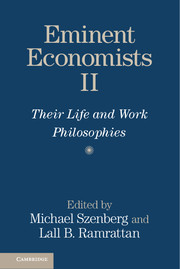Book contents
- Frontmatter
- Dedication
- Contents
- List of Contributors
- Foreword
- Preface and Acknowledgments
- Introduction
- 1 Being There: An Intellectual Journey
- 2 Social Norms in Economics and in the Economics Profession
- 3 Personal Reflections on My Professional Life
- 4 Gray Eminence?
- 5 Biochemist to Economist
- 6 Puzzles and Paradoxes: A Life in Applied Economics
- 7 Succeeding in Economics
- 8 My Research Strategy
- 9 My Philosophy of Economics, Life, and Everything (Not!)
- 10 Finding a Niche
- 11 Become an Economist – See the World
- 12 Practitioner of the Dismal Science? Who, Me? Couldn’t Be!!
- 13 One Job, Four Careers
- 14 My Life and Research Strategy
- 15 How I Ended Up Being a Multifaceted Economist and the Mentors I Have Had
- 16 Searching for My Personal Philosophy
- 17 Learning about the Evolving International Economy
- 18 Confessions of a Wellesley FEM
- 19 God, Ants, and Thomas Bayes
- 20 The Path of a Monetary Economist
- 21 Learning from the Field
- 22 Order in and through Disorder: The Invisible Hand as a Turbulent Regulator
- 23 The Education of an Economist
- 24 Faith, Science, and Religion
- 25 My Studies in International Economics
- 26 Sailing into the Wind
- 27 My Life and Work Philosophy
- 28 Scaling Fortress Economics
- 29 The Accidental Economist
- Index
- References
Introduction
Published online by Cambridge University Press: 05 June 2014
- Frontmatter
- Dedication
- Contents
- List of Contributors
- Foreword
- Preface and Acknowledgments
- Introduction
- 1 Being There: An Intellectual Journey
- 2 Social Norms in Economics and in the Economics Profession
- 3 Personal Reflections on My Professional Life
- 4 Gray Eminence?
- 5 Biochemist to Economist
- 6 Puzzles and Paradoxes: A Life in Applied Economics
- 7 Succeeding in Economics
- 8 My Research Strategy
- 9 My Philosophy of Economics, Life, and Everything (Not!)
- 10 Finding a Niche
- 11 Become an Economist – See the World
- 12 Practitioner of the Dismal Science? Who, Me? Couldn’t Be!!
- 13 One Job, Four Careers
- 14 My Life and Research Strategy
- 15 How I Ended Up Being a Multifaceted Economist and the Mentors I Have Had
- 16 Searching for My Personal Philosophy
- 17 Learning about the Evolving International Economy
- 18 Confessions of a Wellesley FEM
- 19 God, Ants, and Thomas Bayes
- 20 The Path of a Monetary Economist
- 21 Learning from the Field
- 22 Order in and through Disorder: The Invisible Hand as a Turbulent Regulator
- 23 The Education of an Economist
- 24 Faith, Science, and Religion
- 25 My Studies in International Economics
- 26 Sailing into the Wind
- 27 My Life and Work Philosophy
- 28 Scaling Fortress Economics
- 29 The Accidental Economist
- Index
- References
Summary
The former collection of Eminent Economists edited by Michael Szenberg (1992), profiling twenty-two preeminent economists of the preceding decade, has been successful in whetting the appetite of readers but not satiating it. Rather, the idea of such a compilation has created such a niche for itself among economists, readers, and students that it stands to become a genre in itself. Just as William Shakespeare questions the law of diminishing returns in his play Twelfth Night; or, What You Will when Duke Orsino asks for an excess of music that may sicken his appetite for love, readers here seem to want more philosophies and stories of the lives and times of eminent economists. Just as more music will not kill Orsino’s love for the beautiful Lady Olivia, these compilations will keep inspiring new generations of economists bridging times.
Finance and economics combine to form the bedrock of modern-day society, and these economists occupy an important podium attempting to satisfy limitless human wants within the limits of Mother Nature in a sustainable and incremental way. They formulate ideas drawing knowledge from other fields such as mathematics, computer technology, and human behavior, collecting and collating hundreds of bytes of data to understand the forces of the market and make human life just a bit better.
- Type
- Chapter
- Information
- Eminent Economists IITheir Life and Work Philosophies, pp. 1 - 13Publisher: Cambridge University PressPrint publication year: 2014



